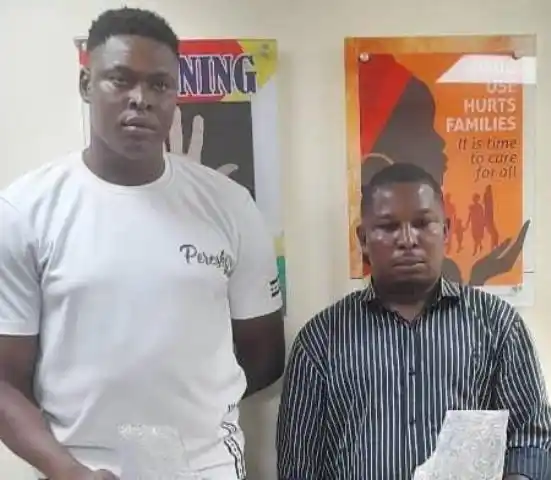News
Qatar-based Drug Kingpins Murphy, Oluchukwu Smashed By NDLEA At Lagos Airport

Qatar-based drug kingpins Murphy, Oluchukwu smashed by NDLEA at Lagos Airport
Operatives of the National Drug Law Enforcement Agency (NDLEA) have smashed two Qatar-based drug kingpins with methamphetamine consignment.
Eyah Celestine Nnamdi, alias Murphy and Ugwuoke Peter Oluchukwu, were arrested by the agency at the Murtala Muhammed International Airport, MMIA, Ikeja, Lagos.
Femi Babafemi, NDLEA’s spokesman, in a statement on Sunday said Ugwuoke was the first to be arrested on 9th June during the outward clearance of Qatar Airways passengers at the departure point, Terminal 2 of the Lagos airport.
He said NDLEA officers discovered that the suspect was travelling to Doha with an Ivorian international passport with the name Hien Narcisse.
“A further scrutiny of his black carry-on luggage led to the discovery of a false bottom concealment of two parcels of crystalline substance that tested positive to methamphetamine weighing 1.00kg.
Preliminary investigation revealed that the suspect is a Nigerian who had gone to obtain an Ivorian passport for his travels.
“He confessed that he travelled to Qatar in August 2022 and returned from the Arab nation about two months ago to perfect arrangement for the movement of the drug consignment,” he explained.
According to Babafemi, a further probe led operatives to discover that his Qatar-based senior partner in the trade simply identified as Murphy was lurking around in Eziani, his home town in Nsukka LGA, Enugu State.
He revealed that Ugwuoke, who hails from Igboeze North Local Government Area of the State claimed he holds a National Diploma in Electrical Engineering from the Federal Polytechnic, Oko.
“A prompt deployment of NDLEA operatives on 10th June to Eziani community of Nsukka Local Government Area of Enugu State, led to the arrest of ‘Murphy’ whose true identity was later discovered to be Eyah Celestine Nnamdi, who had lived in Indonesia for some years before relocating to Doha, Qatar,” he disclosed.
News
Woman killed while crossing road in Anambra

The Federal Road Safety Corps (FRSC), Anambra State Sector Command, has confirmed the death of a woman in an accident at Okpoko Market on the Asaba-Onitsha Road.
The Sector Commander, Mr Adeoye Irelewuyi, who confirmed the accident to journalists in Awka on Thursday, said that the woman was hit while she was crossing the road.
He said that the accident, which occurred on Wednesday, involved a commercial tow truck with registration number XA550BMA.
“Eyewitness report reaching us indicates that the truck was towing a vehicle in an uncontrollable speed along the axis.
“The vehicle that was being towed got detached from the tow truck.
“It hit and killed a female adult, who was said to be crossing the road, while the tow truck continued its movement.
“FRSC rescue team came to the scene and took the woman to Toronto Hospital, Onitsha, where she was confirmed dead and her body deposited at the hospital’s mortuary,” he said.
While sympathising with the family of the dead, the sector commander urged motorists, especially tow truck drivers, to exercise a high level of professionalism.
He also urged the drivers to always use standard equipment and avoid speeding.
News
LASG’s maize palliative impactful, says poultry association chair

The Chairman, Poultry Association of Nigeria (PAN), Lagos State Chapter, Mr Mojeed Iyiola, said the state government’s maize palliative to members of the association made a positive impact on the sector.
Iyiola said this in an interview with the News Agency of Nigeria (NAN) on Thursday in Lagos.
“We received about 150,000 tons of maize in February from the Lagos State government as palliative to cushion the effect of high feed prices.
“The major benefit of the palliative is that it actually cushioned the cost of production for most poultry farmers in the state.
“The palliative was beneficial as it made the cost of some poultry produce, especially eggs to drop,” Iyiola said.
He noted that prior to the palliative, a crate of egg was sold between N3,500 and N3,700 at the farm gate, but after the palliative, it now sells between N3,200 and N3,400.
According to the PAN chair, retailers and middlemen who sell from N3,800 to N4,200 do that for their personal gain.
“We have urged our members to sell their eggs at reasonable prices following the receipt of the palliative from the government.
“We appreciate the Lagos State government for the palliative but we also urge the federal government to do likewise, to further reduce the cost of production in the sector.
“This will consequently lead to drop in the prices of all poultry produce across board,” he said.
He said the palliative was shared among financial members of the association at no extra cost.
“As an association we shared the grains equally across PAN’s eight zones in the state equally. We also mandated each zone not the sell even a grain of the maize.
“We, however, considered new poultry farmers who wanted to the join the association as beneficiaries of the palliative,” said Iyiola.
He noted that through the palliative, more poultry farmers were recruited into the association.
“The maize was shared only to poultry farmers and not feed millers, it is the major component of poultry feed formulation,” he said.










